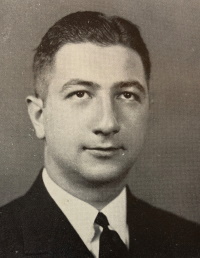

Ernest Herbert Dervishian (10 August 1916–20 May 1984), recipient of the Medal of Honor, was born in Richmond and was the son of Mary Juskalian Dervishian and Hagop Artin Dervishian, Armenian immigrants who operated a candy store. Dervishian attended Richmond public schools and the University of Richmond, where he took premedical courses before deciding to study law. After passing the bar in December 1937 and receiving an LL.B. from the university's T. C. Williams School of Law in June 1938, he practiced law with his brother.
Dervishian enlisted in the United States Army on 12 September 1941 and was assigned to the 135th Infantry Regiment, part of the 34th Infantry Division. The regiment arrived in Northern Ireland for training in May 1942, by which time he had been promoted to sergeant. Sent to North Africa at the end of the year, Dervishian participated in the Tunisian Campaign through May 1943 and was promoted to staff sergeant in June. The division landed at Salerno, Italy, in September 1943.
During the Allies' Italian Campaign the 34th Infantry Division was sent to Anzio, a coastal city where Allied troops had bogged down in January 1944 after an amphibious landing. On 23 May, Dervishian, who had risen to technical sergeant, led four men on forward patrol as the Allies tried to break out of Anzio. Near the town of Cisterna, the team advanced on a German-held railroad embankment. While his men covered his movement, Dervishian moved toward the enemy's dugouts and captured ten soldiers. His men advanced and captured another fifteen Germans in adjacent dugouts. Noticing nine soldiers running across a ridge, the team opened fire and wounded three, while Dervishian dashed ahead and captured the remaining Germans.
Dervishian then led his team into a dense vineyard, where they were pinned down by enemy machine-gun fire fifteen yards away. Playing dead until the machine gunners paused to reload, he rushed the position using a hand grenade and rifle to capture the crew. After a second enemy machine gun crew opened fire, Dervishian ordered his men to withdraw while he jumped onto the machine gun he had just captured and fired at the machine gun emplacement. At the same time he used a captured submachine gun to fire at still another enemy dugout. Simultaneously firing with both hands in different directions, he forced five Germans in each position to surrender. Advancing alone, he captured a third machine gun nest and took six more prisoners. During the engagement, which lasted only about twenty-five minutes, Dervishian and his men captured three machine gun nests, killed many enemy soldiers, and took more than forty Germans prisoner.
After participating in the liberation of Rome in June 1944, he received a battlefield promotion to second lieutenant in July. For his efforts near Cisterna, Dervishian received the Medal of Honor in an official ceremony near the frontlines in Northern Italy on 12 January 1945. He returned to Richmond late in January to a hero's welcome. The city honored him with a Dervishian Day on 1 February that included early closing of city government, schools, and many businesses, a ceremony attended by the governor and other leaders, and a parade that drew a reported 30,000 spectators. He also received tributes from the local Armenian community, the Richmond Bar Association, the city Chamber of Commerce, and the University of Richmond. Returning to active duty later in February, he was sent to postings in Oregon and in Maryland. In September 1945, by which time he had been promoted to first lieutenant, he was placed on terminal leave and returned home to Richmond the following month.
Formally discharged in November 1945, Dervishian rejoined his legal practice with his brother. Dervishian often spoke to civic groups about his experiences during the war, and in 1946–1947 he served as a national vice commander of the American Legion. In 1946 he represented veterans on the state construction committee of the federal Civilian Production Administration. Dervishian served as an assistant commonwealth's attorney in Richmond from July 1947 to December 1959, when he left public service and returned to private practice. On 10 December 1950 he married Anne Garoogian, a resident of Brooklyn, New York. They had three daughters. He served in the army reserves following the war, acting as a staff advocate general, before retiring as a colonel in 1968. Along with such cultural figures as actor Joseph Cotton and writer Tom Wolfe, Dervishian was one of thirty-five Virginians honored by the governor in September 1972 for outstanding national achievement in their fields. Following a short illness Ernest Herbert Dervishian died of a cerebral infarction on 20 May 1984 in a Richmond hospital. He was buried in Westhampton Memorial Park, in Henrico County.
Sources Consulted:
Biography in Richard Lee Morton, comp., Virginia Lives: The Old Dominion Who's Who (1964), 266; birth date provided by daughter Laura Dervishian Inscoe (2011); feature articles (some with portraits), in Richmond News Leader, 3 Aug., 21 Oct. 1944, 24, 26 Jan. 1945; Richmond Times-Dispatch, 31 Dec. 1944, 27, 28 Jan., 2 Feb., 9 Oct. 1945, 1 Feb. 1971; Commonwealth 13 (Feb. 1946): 12–13; The Medal of Honor of the United States Army (1948), 63, 336; Death Certificate, Richmond City, Bureau of Vital Statistics, Commonwealth of Virginia; obituaries in Richmond News Leader, 21 May 1984, and Richmond Times-Dispatch, and Washington Post, both 22 May 1984.
Photograph in University of Richmond The Web (1938).
Written for the Dictionary of Virginia Biography by G. W. Poindexter and John G. Deal.
How to cite this page:
G. W. Poindexter and John G. Deal,"Ernest Herbert Dervishian (1916–1984)," Dictionary of Virginia Biography, Library of Virginia (1998– ), published 2016 (http://www.lva.virginia.gov/public/dvb/bio.asp?b=Dervishian_Ernest_Herbert, accessed [today's date]).
Return to the Dictionary of Virginia Biography Search page.


